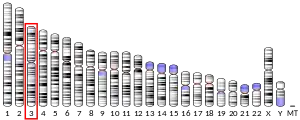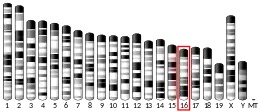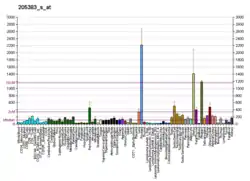ZBTB20
Zinc finger and BTB domain-containing protein 20 is a protein that in humans is encoded by the ZBTB20 gene.[5][6][7]
There is evidence that ZBTB20 may cause primrose disease.
References
- GRCh38: Ensembl release 89: ENSG00000181722 - Ensembl, May 2017
- GRCm38: Ensembl release 89: ENSMUSG00000022708 - Ensembl, May 2017
- "Human PubMed Reference:". National Center for Biotechnology Information, U.S. National Library of Medicine.
- "Mouse PubMed Reference:". National Center for Biotechnology Information, U.S. National Library of Medicine.
- Harboe TL, Tumer Z, Hansen C, Jensen NA, Tommerup N (Sep 2000). "Assignment of the human zinc finger gene, ZNF288, to chromosome 3 band q13.2 by radiation hybrid mapping and fluorescence in situ hybridisation". Cytogenet Cell Genet. 89 (3–4): 156–7. doi:10.1159/000015600. PMID 10965110. S2CID 36861164.
- Zhang W, Mi J, Li N, Sui L, Wan T, Zhang J, Chen T, Cao X (May 2001). "Identification and characterization of DPZF, a novel human BTB/POZ zinc finger protein sharing homology to BCL-6". Biochem Biophys Res Commun. 282 (4): 1067–73. doi:10.1006/bbrc.2001.4689. PMID 11352661.
- "Entrez Gene: ZBTB20 zinc finger and BTB domain containing 20".
Further reading
- Maruyama K, Sugano S (1994). "Oligo-capping: a simple method to replace the cap structure of eukaryotic mRNAs with oligoribonucleotides". Gene. 138 (1–2): 171–4. doi:10.1016/0378-1119(94)90802-8. PMID 8125298.
- Suzuki Y, Yoshitomo-Nakagawa K, Maruyama K, et al. (1997). "Construction and characterization of a full length-enriched and a 5'-end-enriched cDNA library". Gene. 200 (1–2): 149–56. doi:10.1016/S0378-1119(97)00411-3. PMID 9373149.
- Hartley JL, Temple GF, Brasch MA (2001). "DNA cloning using in vitro site-specific recombination". Genome Res. 10 (11): 1788–95. doi:10.1101/gr.143000. PMC 310948. PMID 11076863.
- Wiemann S, Weil B, Wellenreuther R, et al. (2001). "Toward a catalog of human genes and proteins: sequencing and analysis of 500 novel complete protein coding human cDNAs". Genome Res. 11 (3): 422–35. doi:10.1101/gr.GR1547R. PMC 311072. PMID 11230166.
- Strausberg RL, Feingold EA, Grouse LH, et al. (2003). "Generation and initial analysis of more than 15,000 full-length human and mouse cDNA sequences". Proc. Natl. Acad. Sci. U.S.A. 99 (26): 16899–903. doi:10.1073/pnas.242603899. PMC 139241. PMID 12477932.
- Wiemann S, Arlt D, Huber W, et al. (2004). "From ORFeome to biology: a functional genomics pipeline". Genome Res. 14 (10B): 2136–44. doi:10.1101/gr.2576704. PMC 528930. PMID 15489336.
- Mehrle A, Rosenfelder H, Schupp I, et al. (2006). "The LIFEdb database in 2006". Nucleic Acids Res. 34 (Database issue): D415–8. doi:10.1093/nar/gkj139. PMC 1347501. PMID 16381901.
- Cordeddu, Viviana; Redeker, Bert; Stellacci, Emilia; Jongejan, Aldo; Fragale, Alessandra; Bradley, Ted E. J.; Anselmi, Massimiliano; Ciolfi, Andrea; Cecchetti, Serena; Muto, Valentina; Bernardini, Laura; Azage, Meron; Carvalho, Daniel R.; Espay, Alberto J.; Male, Alison; Molin, Anna-Maja; Posmyk, Renata; Battisti, Carla; Casertano, Alberto; Melis, Daniela; van Kampen, Antoine; Baas, Frank; Mannens, Marcel M.; Bocchinfuso, Gianfranco; Stella, Lorenzo; Tartaglia, Marco; Hennekam, Raoul C. (August 2014). "Mutations in ZBTB20 cause Primrose syndrome". Nature Genetics. 46 (8): 815–817. doi:10.1038/ng.3035. PMID 25017102. S2CID 23567698.
External links
- ZBTB20+protein,+human at the US National Library of Medicine Medical Subject Headings (MeSH)
This article incorporates text from the United States National Library of Medicine, which is in the public domain.
This article is issued from Wikipedia. The text is licensed under Creative Commons - Attribution - Sharealike. Additional terms may apply for the media files.




